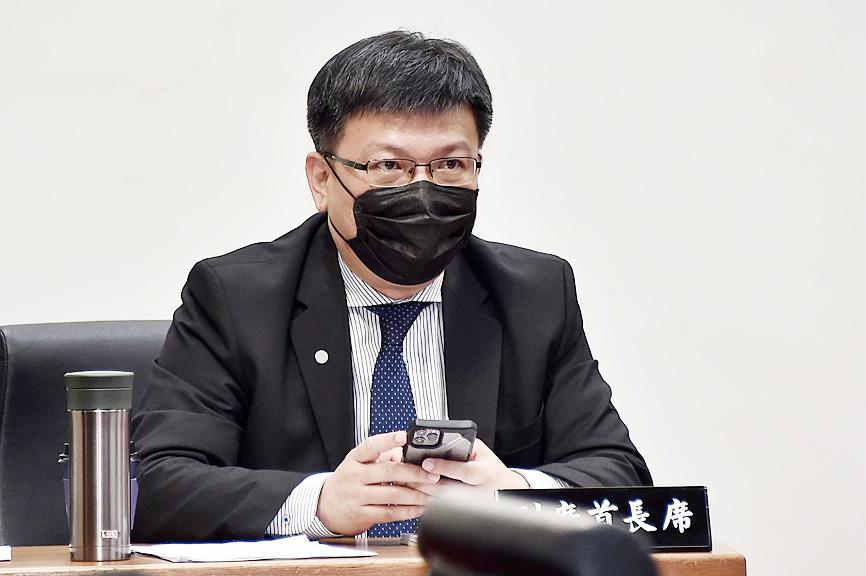A blackout that affected 300,000 households in Taipei and New Taipei City on Sunday morning was caused by a transformer exploding, not because of a shortage of electricity, Deputy Minister of Economic Affairs Tseng Wen-sheng (曾文生) said yesterday.
Tseng also dismissed rumors that the power outage came after Taiwan Power Co (Taipower, 台電) lowered the voltage of the grid, leading to a transformer at a primary substation in Taipei’s Wanlong District (萬隆) becoming worn and causing secondary substations to break down.
“This is a mechanical malfunction not a power supply issue,” Tseng said. “We had plenty of power. Where is the logic?”

Photo: Tu Chien-jung, Taipei Times
The power outage occurred at 9:42am on Sunday after a fire broke out at the Wanlong substation. It affected 305,418 households in Taipei’s Wenshan District (文山) and New Taipei City’s Yonghe (永和), Jhonghe (中和) and Banciao (板橋) districts.
Taipower said the failure occurred after a distribution transformer at the Wanlong substation malfunctioned, resulting in its insulating oil catching fire, which led to an insulation failure and caused the 161 kilovolt and 69 kilovolt power supply systems to shut down.
“It was not a case of operator error, it was equipment failure,” the state-run utility said.
Taipower plans to complete an examination of all of its substations that have the same equipment as the Wanlong substation within 15 days and make improvements before the Lunar New Year holiday, which starts on Jan. 29, Tseng said.
Taipower president Chung Bin-li (鐘炳利) said construction of a new indoor substation in Wanlong District with fire extinguishing equipment was completed two years ago, but due to opposition from residents, the new substation has not been used.
The company plans to compensate the households affected by the power outage.
The bills of industrial users would be cut by the cost of one hour of power consumption if they suffered a power outage of between 10 and 60 minutes, while those of small businesses and household users would be cut by the cost of one day of use if they suffered a power outage that lasted more than one hour.
As power supply was restored for 90 percent of users within 15 minutes and supplies in the districts were fully restored at 1:07pm, 90 percent of affected users are not expected to receive any compensation, while the remaining 10 percent would likely receive only NT$1 in compensation.
Asked to comment on such meager compensation, Minister of Economic Affairs Wang Mei-hua (王美花) said she has instructed Taipower to re-evaluate the situation before paying compensation.
Chinese Nationalist Party (KMT) Legislator Lai Shyh-bao (賴士葆) said at a meeting of the legislature’s Economics Committee yesterday that he had been petitioned by businesses who expressed the hope that the Ministry of Finance would implement tax relief in addition to compensation from Taipower.
In response, Minister of Finance Su Jain-rong (蘇建榮) said as most of the firms that suffered power outages were small businesses, his ministry is mulling the possibility of business tax deductions based on the losses caused by the power outage.

Taiwan’s technology protection rules prohibits Taiwan Semiconductor Manufacturing Co (TSMC, 台積電) from producing 2-nanometer chips abroad, so the company must keep its most cutting-edge technology at home, Minister of Economic Affairs J.W. Kuo (郭智輝) said yesterday. Kuo made the remarks in response to concerns that TSMC might be forced to produce advanced 2-nanometer chips at its fabs in Arizona ahead of schedule after former US president Donald Trump was re-elected as the next US president on Tuesday. “Since Taiwan has related regulations to protect its own technologies, TSMC cannot produce 2-nanometer chips overseas currently,” Kuo said at a meeting of the legislature’s

TECH WAR CONTINUES: The suspension of TSMC AI chips and GPUs would be a heavy blow to China’s chip designers and would affect its competitive edge Taiwan Semiconductor Manufacturing Co (TSMC, 台積電), the world’s biggest contract chipmaker, is reportedly to halt supply of artificial intelligence (AI) chips and graphics processing units (GPUs) made on 7-nanometer or more advanced process technologies from next week in order to comply with US Department of Commerce rules. TSMC has sent e-mails to its Chinese AI customers, informing them about the suspension starting on Monday, Chinese online news outlet Ijiwei.com (愛集微) reported yesterday. The US Department of Commerce has not formally unveiled further semiconductor measures against China yet. “TSMC does not comment on market rumors. TSMC is a law-abiding company and we are

FLEXIBLE: Taiwan can develop its own ground station equipment, and has highly competitive manufacturers and suppliers with diversified production, the MOEA said The Ministry of Economic Affairs (MOEA) yesterday disputed reports that suppliers to US-based Space Exploration Technologies Corp (SpaceX) had been asked to move production out of Taiwan. Reuters had reported on Tuesday last week that Elon Musk-owned SpaceX had asked their manufacturers to produce outside of Taiwan given geopolitical risks and that at least one Taiwanese supplier had been pushed to relocate production to Vietnam. SpaceX’s requests place a renewed focus on the contentious relationship Musk has had with Taiwan, especially after he said last year that Taiwan is an “integral part” of China, sparking sharp criticism from Taiwanese authorities. The ministry said

US President Joe Biden’s administration is racing to complete CHIPS and Science Act agreements with companies such as Intel Corp and Samsung Electronics Co, aiming to shore up one of its signature initiatives before US president-elect Donald Trump enters the White House. The US Department of Commerce has allocated more than 90 percent of the US$39 billion in grants under the act, a landmark law enacted in 2022 designed to rebuild the domestic chip industry. However, the agency has only announced one binding agreement so far. The next two months would prove critical for more than 20 companies still in the process